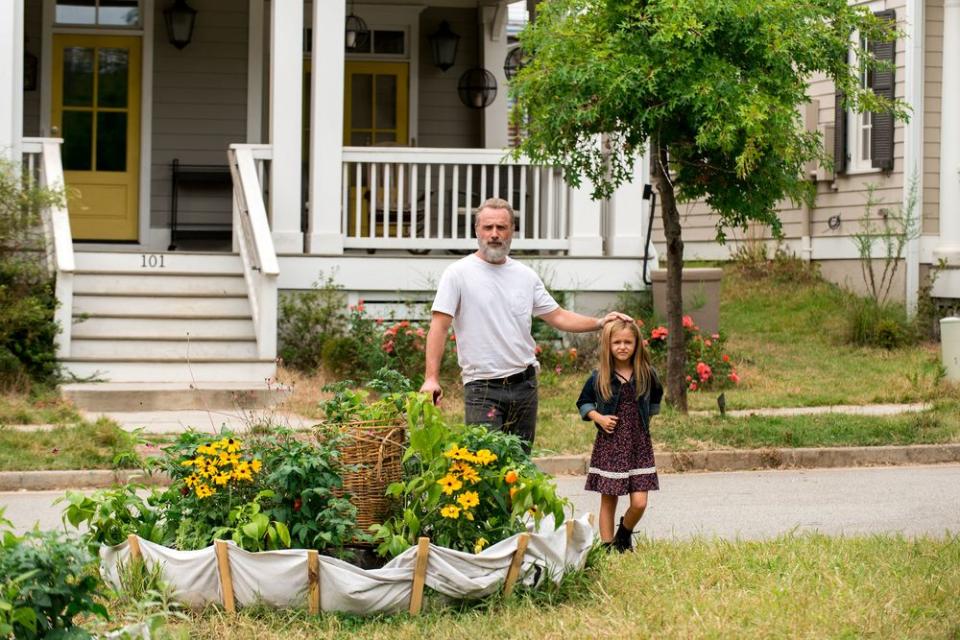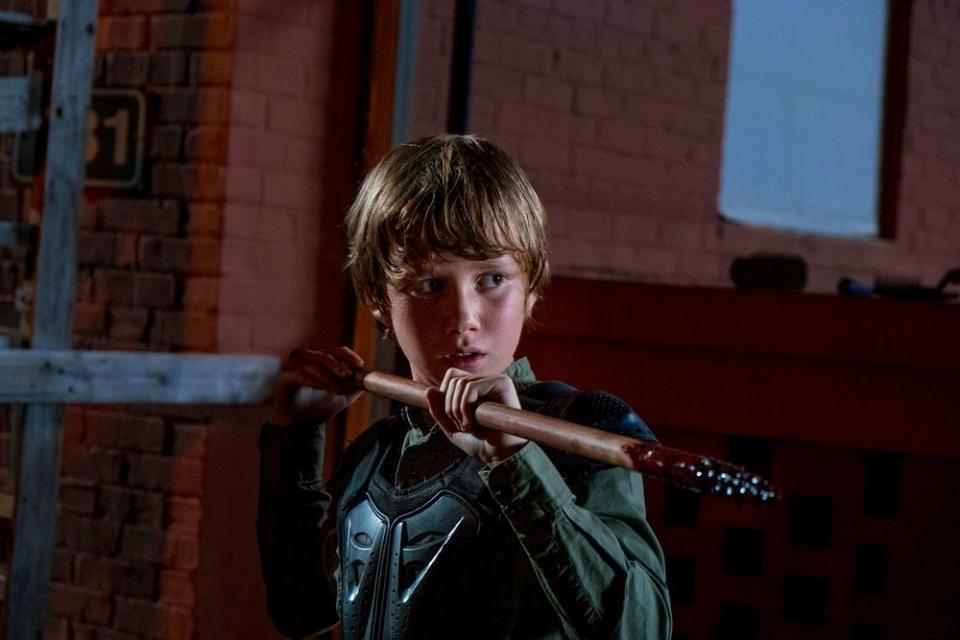The Walking Dead showrunner says time jump may still happen
The Walking Dead showrunner Scott M. Gimple has talked a lot over the years about “remixing” things from the original source material — taking a famous event from the comic but changing up the characters or circumstances for the TV show. It’s a way of honoring the moment while also keeping things fresh and giving viewers an entirely new experience.
Well, the AMC drama just pulled off one its biggest remixes yet — taking the five-year time jump from the comic that was teased in the season premiere, and revealing in Sunday’s midseason premiere that it was actually the deathbed vision of Carl in terms of a future he had seen for his family and the community-at-large should they embrace a kinder, gentler approach to the post-apocalyptic landscape.
It was a powerful and super emotional wrinkle to Carl’s final moments, but according to the showrunner, it does not necessarily mean there will not be a time-jump after the war with Negan is complete. We spoke to Gimple about that as well as all the other big developments from the midseason premiere and what they mean moving forward. (Read what stars Chandler Riggs and Andrew Lincoln had to say about the episode here and here.)

ENTERTAINMENT WEEKLY: First things first: Tell me about coming up with this idea of taking the time jump from the comic books and instead turning it into Carl’s vision for what the future could be if these two sides could settle their differences?
SCOTT M. GIMPLE: It came out of the story we wanted to tell with Carl having the most idealistic approach to what was happening and thus seeing an idealized future and taking a version of what we saw in the books, after issue 127, I believe. And we know what happens after issue 127 in the book isn’t necessarily completely ideal, but when it starts, I remember when I started reading it, I was like, “Aw damn, things have really come together in this world.” I just wanted to play that out further. Because in some ways — other than the calamities that always happen within The Walking Dead — what we see in the book after issue 127 was sort of what Carl was talking about and wanted for his father in the world. So I guess it was a mishmash of these story priorities, character priorities, and then seeing something play out from the book with a lot of fidelity, and yet done completely different.
So was this a case of looking at that big event in the book and being like, “How can we handle this event?” and you found that way through Carl? Or it was more like “Here’s the Carl story I want to tell. What’s a way to tell it? Oh, I could use this time jump from the book”? What was the starting point for these two things converging?
It was very much the latter. We wanted to tell this story where Carl, by affecting the people around him, especially Rick, wants to change the world and change what the world is to them, and then keeping that piece of the book. And, by the way, when I say we’re taking it, that isn’t to say that we might not get there in another way, obviously, but [it led to using] a version of what happened in the book, one of maybe many versions you could see on the show. But it very much was about Carl’s story first. It sprung from Carl’s story.
Does this mean that there will be no time jump on the show coming up?
Oh no, it definitely does not necessarily mean that.
What about the decision to split it up and start the season with that vision as well as the red-eyed Rick “mercy and wrath” scenes as well?
This stuff was used to embody the things that we’re playing with in the order that they’re playing out. Those visions very much have to do with the young man that we see interact with Siddiq initially. And what he wants. We see those visions play out very much as the Siddiq story plays out. With the red-eyed Rick, that is still playing out.
You interspersed Carl’s death and Carl’s speech to Rick about putting away his gun again with Morgan about to kill Gavin when that kid Henry comes out of nowhere and does it first. Tell me about the thinking of linking those two events and cutting back and forth between them.
It’s the world that is versus the world that Carl wants. And very much we start, even Carl, in that interspersing in the world that is in that burnt out church in the state he’s in, which was so wonderfully put together by [director Greg Nicotero]. I was there for the church scene, and it was so heartbreaking and yet so beautiful. But the intercutting — which was built within the script — it was just a question of contrast. All the horrible stuff, and then into the dream of what the world could be.
What’s the significance of Carl ultimately killing himself and shooting himself instead of letting Rick or Michonne do it?
I think that was about growing up, which is a pretty weird thing to say but… he’s a man. He says it. He says, “I grew up.” He has to do that. I mean, obviously it’s not any sort of happy ending, but he became the person he was supposed to be and he grew up. It’s so tragic, and yet he’s grown up. He became an adult and responsible for his own decisions, his own life, and that he could even spare his father and Michonne that awful moment, that he could even give that to them — it was everything.
We know the whole speech that Carl gives Rick is going to play a big part moving forward. We’ve spoken about that. And Rick says to Carl at the end how he’s going to make it real. But what is the immediate effect of this event? Are we going to see an immediate change in Rick in terms of his approach as he’s dealing with this war?
Without giving it up, it’s going to affect Rick and the world very deeply throughout the rest of the season, and maybe not in the ways that we would expect. But what Carl says to him, he says to Michonne too. I mean it weighs upon them in every scene moving forward this season. So they may not be in the same place, they may not come away with the same messages.

What does this situation with Henry murdering Gavin do to Morgan moving forward? Any sort of ramifications in terms of Morgan’s psyche and what that’s going to mean?
It affects him deeply and it challenges him because right now Morgan is like, “Okay, that’s it. This guy and these people forfeit the right to live.” And then he sees Henry do this. Does it challenge him or does it enthuse him? Would he have been happy to see Duane do something like that? And potentially save his life, or save somebody else’s life? It’s complicated because I know that part of Morgan is thrilled and part of Morgan is horrified.
What can you say about that last shot where Rick appears to have a wound in his right side. Also, I noticed a strap around his left leg, don’t know if that means anything, but this again seems to be mirror something that happens in the comic. What can you say about that last shot there?
Oh, God, I don’t want to say too much. I will say, and you’ve kind of already said it — whereas we have an answer about that vision from the first episode, this is something we’ll get answers to as well. Answers are coming. And as the vision that’s framed the first half of the season, what you’re seeing there frames the back half.
So what you can say about the next episode coming up.
It tells four stories in a very interesting way. They’re very different stories and it has a great deal of variety to it. We really get into a lot of different characters within them. It’s not exactly like “22 Short Films About Springfield,” but there’s a whole variety of stories that sort of run the gamut.
The Walking Dead airs Sundays at 9 p.m. on AMC. For more TWD intel, follow Dalton on Twitter @DaltonRoss.

